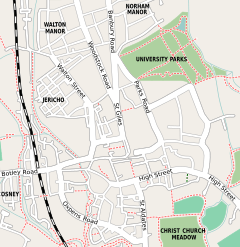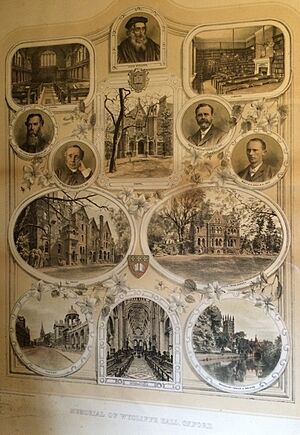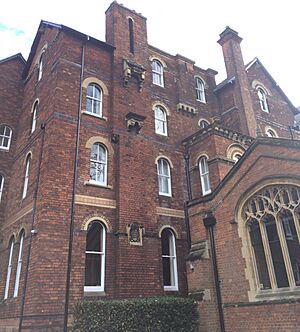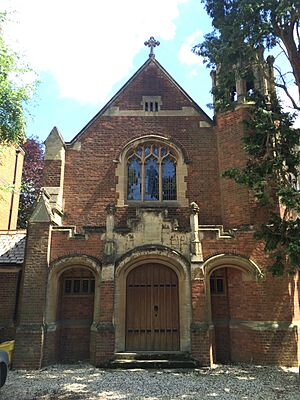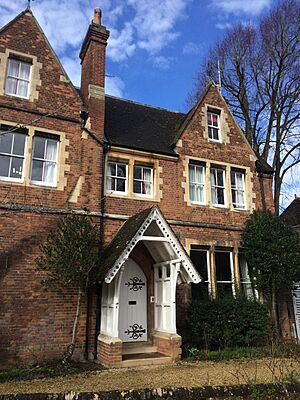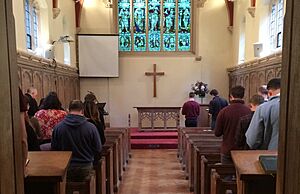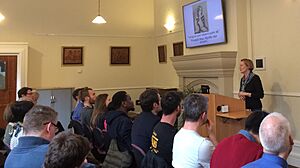Wycliffe Hall, Oxford facts for kids
Quick facts for kids Wycliffe Hall |
|||||||||||||
|---|---|---|---|---|---|---|---|---|---|---|---|---|---|
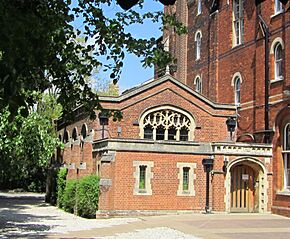 |
|||||||||||||
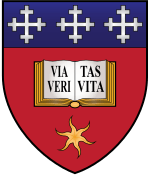
Blazon: Gules, an open book proper the pages inscribed with the Latin words "Via Veritas Vita" in letters sable on a chief azure three crosses crosslet argent and in base an estoile or.
|
|||||||||||||
|
|
|||||||||||||
| University | University of Oxford | ||||||||||||
| Location | 54 Banbury Road, Oxford | ||||||||||||
| Coordinates | 51°45′47″N 1°15′36″W / 51.76302°N 1.260095°W | ||||||||||||
| Motto | Via, Veritas, Vita "The Way, the Truth, the Life" (John 14:6) |
||||||||||||
| Established | 1877 | ||||||||||||
| Named for | John Wycliffe | ||||||||||||
| Sister college | Ridley Hall, Cambridge | ||||||||||||
| Principal | Michael Lloyd | ||||||||||||
| Undergraduates | ~90 | ||||||||||||
| Postgraduates | ~30 | ||||||||||||
| Visiting students | ~50 | ||||||||||||
| Map | |||||||||||||
Wycliffe Hall is a special kind of college at the University of Oxford that works closely with the Church of England. It's named after John Wycliffe, a famous Bible translator and reformer from the 1300s. He was also a leader at Balliol College, Oxford a long time ago.
Wycliffe Hall started in 1877. It helps train people, both men and women, for church roles in the Church of England and other Christian churches. Many students also study subjects like theology (the study of religion), education, and philosophy. The hall has strong roots in a part of Christianity called Evangelical Anglicanism. It also includes ideas from Charismatic and Open Evangelical traditions.
This hall is the third-oldest Anglican theological college. In 2020, it had trained more Church of England bishops than any other similar place.
Contents
A Look at Wycliffe Hall's History
How Wycliffe Hall Began
For many years, to be a part of the University of Oxford, you had to agree with certain religious rules of the Church of England. But in the mid-1800s, the university became open to students and teachers of all religions, or no religion at all.
Because of this change, some people worried about how future church leaders would be trained. So, in 1876, a group decided to create two new colleges. These colleges would offer extra training for church leaders based on strong Christian beliefs. One college was planned for Cambridge, and the other for Oxford.
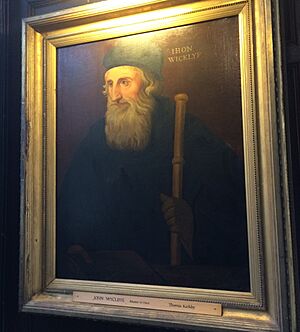
Money was quickly raised, and a group of founders came together for the Oxford college. Their goal was to keep teaching Bible-based theology at Oxford. They wanted to train future church leaders to be "mighty in scripture" and ready to share the teachings of the Church of England. The new hall was named after John Wycliffe, who is often called the 'morning star' of the Reformation.
Wycliffe Hall was one of more than 20 Anglican theological colleges started in England during the late 1800s. Its "sister college," Ridley Hall, Cambridge, opened in 1881. Wycliffe Hall also had strong connections with student Christian groups in Oxford. Many of its first students were Oxford graduates. In 1890, the hall began accepting students who had not yet graduated from university.
Wycliffe Hall in the 1900s
William Henry Griffith Thomas was a very well-known leader of Wycliffe Hall from 1905 to 1910. He was a famous theologian and taught many classes himself. Today, there's a bronze statue of him in the dining room.
During World War I, Wycliffe Hall helped out by housing people who had to leave their homes in Serbia. It also trained people from the Royal Flying Corps, who even built a practice airplane in the dining hall!
In 1927, for the hall's 50th anniversary, the leader took students to Jerusalem for their summer term. They went on four more trips to Jerusalem in the 1920s and 1930s. During one trip in 1929, students even helped keep order during some local events. The leader of these trips, F. G. Brown, later became a bishop in Jerusalem. Pictures from these trips can still be seen in one of the hall's buildings today.
In the 1950s and 60s, Wycliffe Hall faced some challenges. Student numbers dropped, and the hall decided to focus more clearly on its original Christian mission. New leaders were brought in to help the hall get back on track.
The hall celebrated its 100th birthday in 1977 with a special service and a party on the lawn. In 1996, Wycliffe Hall became a permanent private hall of the University of Oxford, under the leadership of Alister McGrath.
Recent Times at Wycliffe Hall
In the early 2000s, Wycliffe Hall started two important new programs. SCIO (Scholarship and Christianity in Oxford) began in 2002, and OCCA (the Oxford Centre for Christian Apologetics) started in 2005. SCIO still brings many students to the hall each year.
The hall went through some changes in its leadership in the late 2000s and early 2010s. After a period of searching for the right person, Michael Lloyd was appointed as the new principal in 2013. He has been working to expand the hall and welcome more female students.
Since the mid-2010s, Wycliffe Hall mainly accepts older students (over 21) for its programs, except for the SCIO program.
Exploring Wycliffe Hall's Buildings
Wycliffe Hall has always been located in the North Oxford area. The buildings used by the hall were first designed as family homes in the 1860s. They were later changed to become part of the college.
The main building, at 54 Banbury Road, was built in 1866. It was a large house called "Laleham." In 1877, a group of Christian leaders bought it and renamed it Wycliffe Hall. Over the years, new parts were added to the house, including more student rooms and a library. In 1913, a new dining hall was built, which changed the main entrance of the building. This dining hall later became a lecture theatre in 1980.
Old Lodge, at 52 Banbury Road, is next to the main building. It was built in 1868 and was first a convent. Wycliffe Hall bought it in 1883. This building was first used as the principal's home. In 1930, it was changed to have common rooms for students and staff. Today, the hall's library is located in Old Lodge.
A chapel and bell tower were added between the two main buildings in 1896. The chapel has a beautiful stained-glass window showing John Wycliffe. A prayer room was added to the chapel later.
Over the 1900s, Wycliffe Hall also bought several houses on Norham Gardens. The gardens of these houses were later joined together to create a large green space for the hall. One of these houses, 2 Norham Gardens, was used as the principal's home for a long time.
In the late 1960s and early 1970s, there were ideas to combine Wycliffe with other colleges or even rebuild it elsewhere. But none of these plans happened.
The Talbot Rice Dining Hall was built in 1980, allowing the older dining hall to become a lecture theatre. More recently, in the 1990s, an extension was added to 2 Norham Gardens for more student rooms and offices. Another house, 8 Norham Gardens, was acquired in the early 2000s.
Training for Church Roles
Training people for church leadership roles is still the main focus of Wycliffe Hall. They also offer courses for people who want to serve the church in other ways, like through academic study or explaining Christian beliefs.
Students training for church roles are expected to attend daily chapel services. Learning ancient languages like Greek and Hebrew is also important, and many students are encouraged to study them. The hall also has "Integrated Study Weeks" where students learn about topics like evangelism (sharing faith) and ethics.
Students lead fellowship groups and take turns leading chapel services. They also get practice in giving sermons (preaching).
In the past, Wycliffe students would do a "pastoral job" on Sundays, like preaching or visiting people. Today, students do placements in churches and colleges. These placements help them learn by watching, thinking about what they see, and taking part. Students also go on college missions to different places like schools, universities, and local churches.
Academic Programs and Achievements
Wycliffe Hall students can study many different academic programs at Oxford University. These include certificates, diplomas, bachelor's degrees (like a BA in Theology), master's degrees, and even doctoral programs.
Wycliffe Hall has a strong academic record. In 2012 and again in 2017, the hall topped the University of Oxford's Norrington Table for theology. This means its students achieved excellent results in their exams. In 2012, all five of its BA students earned the highest possible grade.
Student Life at Wycliffe Hall
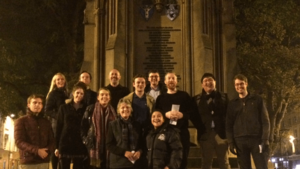
Today, Wycliffe Hall has about 60 students training for Church of England roles and about 60 other students. It also hosts up to 50 visiting students, many from the United States. Students can win the Buechner prize for creative writing, named after a famous American author.
Students can also join in many activities across the wider university, including sports. Some full-time students live on campus, and they can eat in the dining hall on weekdays. There are also a few formal dinners each term. All students training for church roles are expected to help out with at least one "college duty." There are also activities for the spouses of students, including a mid-week prayer and Bible study group.
People Connected to Wycliffe Hall
Hall Council Chairmen
- 1877 Robert Payne Smith
- 1948 Christopher Chavasse
- 1969 Stuart Blanch
- 2005 James Jones
- 2009 Peter Forster
- 2012 Mike Hill
- 2016 Julian Henderson
Principals (Leaders)
- Robert Baker Girdlestone, 1877–1889
- Francis James Chavasse, 1889–1900
- Harry George Grey, 1900–1905
- William Griffith Thomas, 1905–1910
- Harry George Grey, 1910–1918
- Henry "Harry" Beaujon Gooding, 1919–1925
- Francis Graham Brown, 1925–1932
- John Taylor, 1932 to 1942
- Julian Thornton-Duesbery, 1943 to 1955
- Francis John Taylor, 1956–1962
- David Anderson, 1962–1970
- James (Jim) Peter Hickinbotham, 1970–1978
- Geoffrey Shaw, 1978–1988
- R. T. France, 1989–1995
- Alister McGrath, 1995–2005
- Richard Turnbull, 2005–2012
- Michael Lloyd, 2013 to present
You can see pictures of past principals on a staircase in South Wing.
Famous Former Students
- Hewlett Johnson (1900–1901) – Known as the "Red Dean" of Canterbury.
- Wilbert Awdry (1932–1933) – The creator of The Railway Series children's books (like Thomas the Tank Engine).
- Donald Coggan (1934) – Became the 101st Archbishop of Canterbury.
- J. I. Packer (1949–1952) – A well-known author and theologian.
- N.T. Wright (1973–1975) – A famous writer and theologian.
- Nicky Gumbel (1983–1986) – Developed the Alpha Course, which helps people explore Christianity.
- Rachel Treweek (1991–1994) – Became the 41st Bishop of Gloucester.
- Vicky Beeching (1997–2000) – A worship leader and advocate.
- Jonathan Aitken – A politician, author, and broadcaster.
Fellows (Important Members of Staff)
- Clair Linzey – An advocate for animal rights.
 | George Robert Carruthers |
 | Patricia Bath |
 | Jan Ernst Matzeliger |
 | Alexander Miles |


